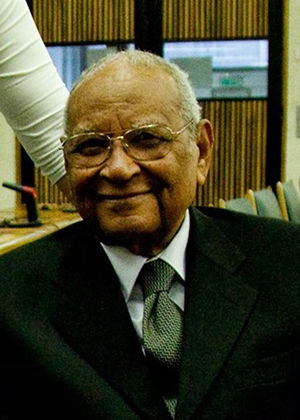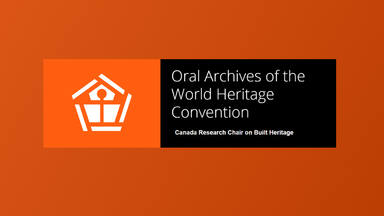
Interview
Amadou-Mahtar M’Bow
World Heritage Convention
Amadou-Mahtar M'Bow is a Senegalese academic and politician. After graduate studies at the Sorbonne in Paris, he returned to Senegal to teach geography and history. He was Minister of Education and Culture between 1952 and 1957, a period of internal self-government before embarking on the struggle for independence.
He became a member of the National Assembly, first as Minister of National Education (1966-1968) and then as Minister of Culture and Youth (1968-1970). From 1966 onwards, he served on the Executive Board of UNESCO as the representative of Senegal, before becoming Assistant Director-General for Education in 1970. He was elected Director-General of UNESCO in 1974 and serve for 13 years . In 2008, at the age of 87, he chaired the National Conference of Senegal, a large gathering to address the political and social problems of the country.
Amadou-Mahtar M'Bow is the author of numerous publications, including several on UNESCO's missions, in particular Aux sources du futur : La problématique mondiale et les missions de l’UNESCO (L’Harmattan, 2011). He has also contributed to the publications of the Académie du Royaume du Maroc through some thirty papers dealing with major cultural, political, economic and social problems of the world, often from an African perspective.
During his years as Director-General of UNESCO, Amadou-Mahtar M'Bow oversaw the work of the secretariat for the World Heritage Convention. He received the first ratifications which made it possible for the Convention to enter into force and oversaw the inscription of the first sites on the World Heritage List in 1978.
Interview with
Amadou-Mahtar M’Bow
22 October 2009, Paris, France
The following audio excerpts are from an interview with Amadou-Mahtar M'Bow by Mechtild Rössler and Petra Van Den Born the 22 October 2009 in Paris, France. In particular, he gives an account of UNESCO's first interventions in the field of cultural heritage, putting into context of the birth of the 1972 Convention. He also stresses the importance of international cooperation and calls for the protection of the too often neglected types of heritage, from modernism to natural sites.
- 1. The World Heritage Convention
- 1a. Involvement and participation of Amadou-Mahtar M’Bow in World Heritage
- 1b. Origins of the Convention
- 1c. Conservation challenges for threatened monuments
- 1d. Objectives of the Convention
- 1e. World Heritage List
- 1f. Failures and successes of the Convention
- 2. World Heritage Committee
- 3. Advisory bodies : IUCN, ICOMOS and ICCROM
- 4. The secretariat of UNESCO
- 5. The commitment of States Parties and the international community
Oral Archives of the
World Heritage Convention
Under the leadership of the Canada Research Chair on Built Heritage at the University of Montreal, an international team of researchers conducts interviews with pioneers of World Heritage to capture memories of important moments in the history of UNESCO Convention.
Launched in 2006, this initiative is part of the UNESCO History project that celebrated the 60th anniversary of the creation of UNESCO. The Oral Archives project records the precious witness of people closely associated with the creation and implementation of the Convention. Their recollections and views have greatly enriched the book by Christina Cameron and Mechtild Rössler, Many Voices, One Vision: The Early Years of the World Heritage Convention (Ashgate/Routledge, 2013).
